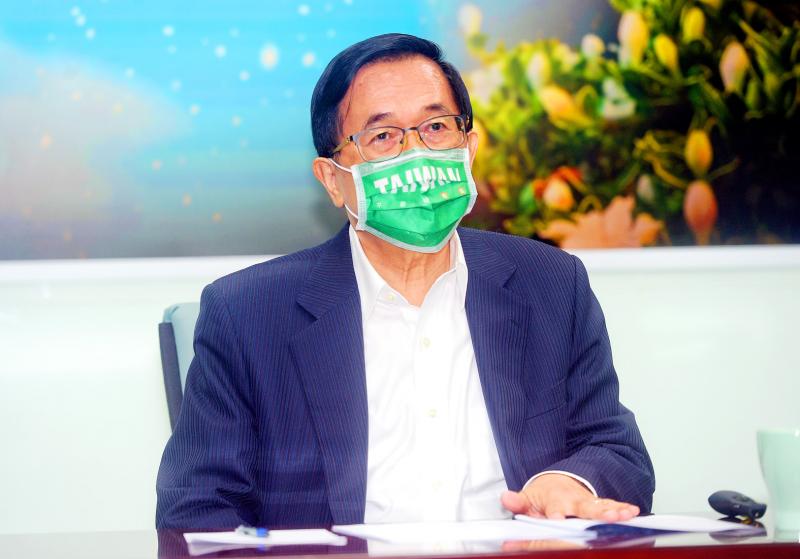The High Court yesterday acquitted former president Chen Shui-bian (陳水扁) of charges related to his personal use of state funds following a recent change to the Accounting Act (會計法), while his wife and son were sentenced on bribery charges.
In its second retrial ruling, the High Court dismissed all charges against Chen, his wife, Wu Shu-jen (吳淑珍), and his close aides relating to the former president’s use of Presidential Office funds from 2000 to 2008.
The judgement was made in accordance with a contentious May amendment to Article 99-1 of the Accounting Act, which makes the personal use of such funds legal and absolves officials of liability for its improper use prior to Dec. 31, 2006, the court said.

Photo: Chang Chia-ming, Taipei Times
The amendment, which was pushed through the legislature by the Democratic Progressive Party and came into effect last month, expanded the exemption of punishment for the misuse of special allowance funds to include state affairs funds available to the president.
Chen was first indicted on charges of corruption, forgery and money laundering in 2008, with prosecutors accusing the now-71-year-old of misusing a total of NT$104 million (US$3.47 million) from the state affairs fund for personal use.
Chen has maintained his innocence, saying that the fund was used to promote confidential diplomatic missions, including paying a US lobbying firm, supporting pro-Taiwan democracy parades, and sponsoring democracy advocates and groups.
The case is one of several corruption scandals that Chen became embroiled in after leaving office.
In 2010, he was sentenced to about 20 years in jail for accepting bribes in a land deal in Taoyuan and other cases.
Chen was released on conditional medical parole in 2015.
The High Court yesterday found Wu guilty of money laundering in a separate case and sentenced the 69-year-old to two years in prison.
The court said that Wu had instructed her son, Kaohsiung City Councilor Chen Chih-chung (陳致中), and daughter-in-law, Huang Jui-ching (黃睿靚), to place the money she received from bribes relating to the land deal and the construction of Taipei Nangang Exhibition Center into overseas bank accounts.
Wu, who was a legislator from 1987 to 1990, was previously sentenced to 17-and-a-half years in prison for bribery and other charges in 2010. She has yet to serve time in jail due to health issues.
Chen Chih-chung was sentenced to one year in prison yesterday and fined NT$1.5 million for his involvement in the money laundering case, while Huang was given four years’ probation and fined NT$1 million.
The sentences can be appealed.

Taiwan has received more than US$70 million in royalties as of the end of last year from developing the F-16V jet as countries worldwide purchase or upgrade to this popular model, government and military officials said on Saturday. Taiwan funded the development of the F-16V jet and ended up the sole investor as other countries withdrew from the program. Now the F-16V is increasingly popular and countries must pay Taiwan a percentage in royalties when they purchase new F-16V aircraft or upgrade older F-16 models. The next five years are expected to be the peak for these royalties, with Taiwan potentially earning

STAY IN YOUR LANE: As the US and Israel attack Iran, the ministry has warned China not to overstep by including Taiwanese citizens in its evacuation orders The Ministry of Foreign Affairs (MOFA) yesterday rebuked a statement by China’s embassy in Israel that it would evacuate Taiwanese holders of Chinese travel documents from Israel amid the latter’s escalating conflict with Iran. Tensions have risen across the Middle East in the wake of US and Israeli airstrikes on Iran beginning Saturday. China subsequently issued an evacuation notice for its citizens. In a news release, the Chinese embassy in Israel said holders of “Taiwan compatriot permits (台胞證)” issued to Taiwanese nationals by Chinese authorities for travel to China — could register for evacuation to Egypt. In Taipei, the ministry yesterday said Taiwan

Taiwan is awaiting official notification from the US regarding the status of the Agreement on Reciprocal Trade (ART) after the US Supreme Court ruled US President Donald Trump's global tariffs unconstitutional. Speaking to reporters before a legislative hearing today, Premier Cho Jung-tai (卓榮泰) said that Taiwan's negotiation team remains focused on ensuring that the bilateral trade deal remains intact despite the legal challenge to Trump's tariff policy. "The US has pledged to notify its trade partners once the subsequent administrative and legal processes are finalized, and that certainly includes Taiwan," Cho said when asked about opposition parties’ doubts that the ART was

If China chose to invade Taiwan tomorrow, it would only have to sever three undersea fiber-optic cable clusters to cause a data blackout, Jason Hsu (許毓仁), a senior fellow at the Hudson Institute and former Chinese Nationalist Party (KMT) legislator, told a US security panel yesterday. In a Taiwan contingency, cable disruption would be one of the earliest preinvasion actions and the signal that escalation had begun, he said, adding that Taiwan’s current cable repair capabilities are insufficient. The US-China Economic and Security Review Commission (USCC) yesterday held a hearing on US-China Competition Under the Sea, with Hsu speaking on